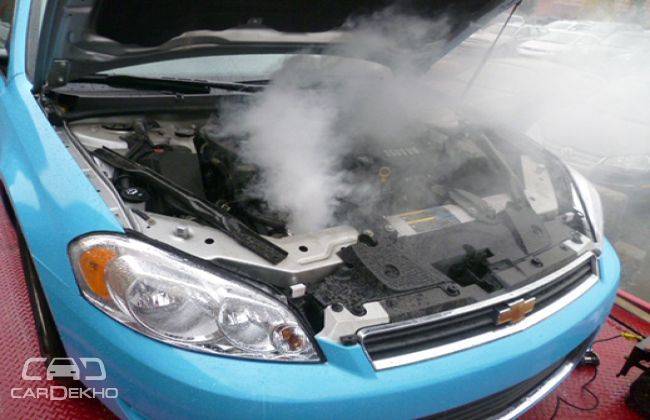7 reasons of car overheating with remedies
Modified On Feb 25, 2015 10:10 AM By Rajpal
- 1 Comments
- Write a comment
With the advancement of technology, car overheating is not a common problem anymore. However, there are still probabilities that your car can overheat due to some faulty part or lack of cooling agents. It may persist because of various problems, including one of the common problem like lack of coolant and much bigger situation like a blown head gasket. In this article, we will tell you how to diagnose car overheating and how to get rid of it..

What to do when car overheats:
If your car gets overheated, then there can be many reasons behind it and if you keep ignoring it, your car will breakdown in middle of the road and worse you will end up paying a lot of money. So, whenever your car shows signs of overheating, you should know what you exactly need to do. All the cars come equipped with an overheat indicator or a temperature gauge, so whenever the sign occurs or the gauge crosses the optimal mark, it notifies that your car is getting overheated. Worse is, when you don’t notice the signs and you see smoke coming off the engine bay or car gets off in the middle of the road. In such condition, do not panic and pull over the car to a safe place follow these simple steps:

- Do not open the hood immediately, as the hood can be hot and steam can burn your hands. Wait until the car gets cool down and temperature gauge shows the optimum temperature level.
- Once you open the hood, check the coolant level in the radiator and reservoir tank. Take help of user manual if you can’t locate the coolant reservoir tank.
- Now check the radiator cap, it should be cool before you open it. If it is on the right temperature, twist it off with the help of a towel. Don’t try to open the radiator cap immediately after cutting the power off, as extremely hot steam can come out of it.
- Also inspect both the upper or lower radiator hose and check if any of the heater hoses have not been blocked, disconnected or burst.
- Switch on the car and check, if the Radiator fan is working or not
Now as you have already inspected it, check if you have found any of these problems
1. Low Coolant Level:

Low coolant is the most common culprit of car overheating. Coolant is the main cooling agent in your car and the engine's cooling system relies on it. The coolant agent circulates and removes heat from the engine. So, if your coolant reservoir is empty or has a little fluid agent, you need to top it up.
Reasons:
If the periodic service is due, most certainly the coolant level has been dropped by a large margin. The other reasons can include a leakage, one of the radiator hoses might be damaged or there can be a blockage in any of these hoses. There are other places from where coolant can leak these includes water pump, thermostat housing, heater core, head gasket, freeze plugs, automatic transmission oil cooler, cylinder heads and block.
What to do: If you are carrying coolant with you, top-up the reservoir and radiator to the optimum level, take help of your owner’s manual for the same. If you are not carrying coolant and in a hurry, you can put water in the radiator, to cool down the car, but it won’t last long and you will need to repeat the process. If the hoses are damaged or blocked, we will advise you to call 24x7 assistance or need to find a local mechanic.
2. Blocked Heater/Radiator Hoses:

If the coolant level is at the optimum level, then there is a possibility that there are blockages in the cooling system.
Reasons:
The reasons can include rust, dirt and sediment, which block or impede coolant flow. Improper flow through the cooling system affects the ability to control engine temperature. Due to this, the engine temperature rises and car overheats.
What to do:
In this case, you will need professional help, as there are blockages you can’t cool down the car by any mean and it has to be tow down to the garage, where flush and refill will be done.
3. Electric Cooling Fan / Radiator Fan Failure:

The main function of the electric cooling fan is to draw cooler air into radiator when car isn't going fast. If your car is overheating, look under the hood to check if radiator fan is running. If the radiator fan is not coming on and you are moving slow, it will cause your engine to overheat. The main function of the electric cooling fan is to draw cooler air into radiator when car isn't going fast. If your car is overheating, look under the hood to check if radiator fan is running.
Reasons
There are a few reasons, which can stop your radiator fan to work. Sometimes, fan motor can burn out; therefore the fan won’t work at all. An easy way to check this is your air conditioning unit, most of the time radiator fan turns ON when you switch on the AC. If it is not turning ON with AC, it indicates towards a faulty radiator fan or switch. Sometimes, a small stone or other object penetrates into the fan and can cause obstacle in its operation, try to remove it as it can burn the fan motor.
What to do:
If a fan is not working, it is advisable to call 24x7 road assistance or locate a local mechanic. If you know some nearby place, drive to there at moderate speeds.
4. Faulty Radiator

Radiator is the center of your car’s cooling mechanism, it is actually a series of tubes and fins, and when coolant passes through these, the temperature of the coolant reduces. So, if the radiator is not working fine, the coolant won’t be able to cool down and the car will overheat.
Reasons:
With time and usage of wrongly concentrated coolant, your radiator can have some clogging, leaks that are also some of the most common causes of radiator failure.
What to do:
Nothing much can be done, you need to take your car to the nearest service center, sometime radiator flushing fixes the problem, else, you have to get it replaced. Radiator flushing is advisable on every 30,000 km to avoid any kind of clogging.
5. Faulty Water Pump

The water pump can be termed as the ‘heart’ of the cooling system; its main function is to propel coolant through the cooling system. Sometimes, the water pump gets malfunctioned, which leads to improper coolant flow.
Reasons:
There can be several reasons of water pump malfunctioning that includes seal leakage, shaft breakage and casting breakage. A broken or loose belt can also prevent the belt from functioning properly.
What to do:
The pump needs to be repaired in this case.
Apart from these regular problems, there can be other big issues, which are rare, but if you have already done more than 50,000 km on your car, then there are chances that any of these can happen with your car.
6. Faulty Thermostat:

The thermostat valve is a heat-sensitive valve, which allows coolant to flow through the engine. The valve opens and closes according to engine temperature. When you start the engine, the valve remains in close position until the engine heats up properly. Once the temperature rises, it opens up and let the hot coolant passes through the radiator. If the thermostat valve gets stuck in the closed position, it won’t let hot coolant passes through the radiator, and lead to engine overheating. An easy way to inspect the same is to check the temperature of the upper radiator hose, if it is not too hot and your car still showing overheat sign, it shows that the thermostat has malfunctioned.
Reasons:
Thermostat valve goes faulty in severe engine overheating conditions. Another commonly seen problem is the blockage of bleeder valve. In such condition if you refill the coolant, it won’t let the air vent from the system and could get trapped under the thermostat and form a steam pocket, that prevents the thermostat from opening and may cause the engine to overheat.
What to do:
If you have a faulty thermostat, you have to replace it with a new one, or if the air has been trapped in, you have to remove it once and clean the bleeder valve.
7. Head Gasket Failure:

This is the worst possible condition responsible for overheating problem of your car. The head gasket is a crucial part of your engine, which forms a seal between the engine block and cylinder head. The head gasket seals the combustion chambers, coolant and engine oil passes. So, the head gasket is responsible for sealing the high pressure combustion gases, engine coolant and engine oil. If the head gasket has blown up, it can lead to some very serious issues. So, if your car is getting overheated on a regular basis and you haven’t find any of the reasons stated above, there is a problem with your head gasket. You can identify the same by observing any of these issues
. Signs of coolant leaking below the exhaust manifold
. White smoke from the exhaust pipe
. Bubbles in the radiator or coolant overflow tank
. White milky engine oil (Looks like chocolate milk)
. Significant loss of coolant with no visible leaks
Reasons:
The head gasket can blow up because of the extreme pressure in the combustion chambers. Sometimes, longer service intervals make your coolant corrosive and it can damage the head gasket as well. Sometimes, it fails because it hasn’t been installed properly or it was faulty when installed, however it happens rarely.
What to do:
Nothing much can be done in this situation and you have to get it replaced, but make sure you get it done from authorised service center.
11 out of 11 found this helpful












